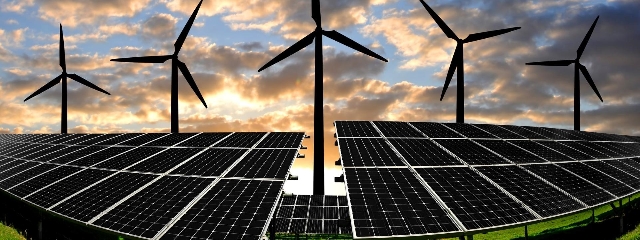SOLAR – the global solution everyone knows about
 Solar energy
Solar energy
Africa is blessed with abundant solar power due to the scorching sun. Solar power should be the alternative energy source to power vehicles, generating plants, and small-scale and commercial farming.
It could also be used for powering industries. For instance, during power outages, most heavy industries like Valco in Ghana had to close down because of insufficient power.
Solar power is renewable and does not produce greenhouse gases or other pollutants. It is also a very efficient source of energy. It is estimated that if Africa could harness just 1% of its solar resources, it would be enough to meet the continent's energy needs. Despite its many benefits, some challenges still need to be addressed to make solar power the main source of energy in Africa. (Trotter, 2016)
For example, the high cost of solar panels and batteries is a barrier to widespread adoption. In addition, the lack of trained personnel and infrastructure presents another challenge.
With the high cost of crude oil on the world market, solar power is becoming an increasingly attractive option for Africa. Solar power could be the continent's main energy source if the challenges can be overcome.
Africa's solar potential
Africa is a continent with immense untapped solar potential. Solar energy could provide a much-needed boost to Africa's development, helping to address the continent's electrification challenge and contribute to economic growth.
Solar energy currently provides just a fraction of Africa's total electricity needs despite its huge potential. However, there are signs that this is changing, with a growing number of African countries investing in large-scale solar projects. (Hirth, 2015)
Solar power could play a major role in meeting Africa's energy needs and supporting its development goals if harnessed effectively.
The challenge of electrification in Africa
Africa is the world's least electrified continent, with over 600 million people (around 60% of the population) without access to electricity. This lack of access to electricity is a major barrier to development, as it limits economic growth and social progress opportunities.
In order to meet the needs of its growing population, Africa will need to increase its electricity generation capacity significantly. Solar energy could play a key role in meeting this demand, as the continent has huge untapped solar resources. (DURSUN, 2021)
Benefits of solar energy in Africa
Solar energy is an important resource for Africa. It has the potential to provide a clean and renewable source of power for the continent's growing population and economy.
Solar energy can also help improve access to electricity in rural and remote areas, boosting economic development and reducing poverty.
There are many other benefits of solar energy that could greatly benefit Africa. For example, solar energy can help create jobs, improve food security, and promote peace and stability.
With the right policies in place, solar energy could significantly power Africa's future. Let us look at the detailed benefits of solar energy.
1. Renewable Energy Source: Solar power is a renewable energy source, meaning it can be used repeatedly without running out. It is also environmentally friendly because it does not produce harmful emissions or pollutants.
2. Reduces Electricity Bills: Solar panels can help you save money on your electricity bills by generating free electricity from the sun. In some cases, you may even be eligible for government incentives or grants to offset the cost of installing solar panels.
3. Diverse Applications: Solar technology can be used for various applications, including generating electricity, powering homes and businesses, providing hot water, and even cooling buildings.
4. Low Maintenance Costs: Solar panels have very low maintenance costs and usually only need to be cleaned a few times a year. They also have a long lifespan, typically lasting 20 to 30 years.
5. Technology Development: Solar technology is constantly evolving and becoming more efficient and affordable. In the past few years, the cost of solar panels has dropped significantly, making them more accessible to a wider range of people. (Scheer, 1995)
Disadvantages of Solar Energy
Let us look at the other side of the coin and examine some disadvantages of solar energy.
1. Cost: Solar panels are a significant initial investment. However, they will eventually pay for themselves through savings on your energy bill. In the meantime, government incentives are available to offset some of the costs.
2. Weather-Dependent: Solar panels rely on sunlight to generate power. This means that output can be reduced on cloudy or overcast days.
3. Solar Energy Storage Is Expensive: Batteries that store solar energy can be expensive and have a limited lifespan.
4. Uses much Space: Solar panels need much space to generate enough power for most homes and businesses. This may not be practical for everyone.
5. Associated with Pollution: The manufacturing process of solar panels can release harmful environmental pollutants. However, once installed, solar panels create clean energy with no emissions.
Challenges to implementing solar energy in Africa
There are many challenges to implementing solar energy in Africa. These include:
- The high cost of solar panels and other equipment.
- The lack of trained personnel to install and maintain the equipment.
- The lack of an adequate electrical grid to connect the solar panels.
- Political instability in many African countries.
- The continent's high levels of poverty and illiteracy.
Despite these challenges, there are, as stated, many reasons solar energy is a good option for Africa.
The future of solar energy in Africa
The future of solar energy in Africa is very promising. The continent has an abundance of sunlight, making it an ideal location for solar power generation. Solar energy is also a clean and renewable resource, making it an attractive option for Africa's development.
There are already many successful solar energy projects underway in Africa. In South Africa, for example, a large-scale solar farm has been built that can generate enough electricity to power over 200,000 homes.
Here are also smaller-scale solar projects being implemented in rural areas of the continent, providing much-needed power to communities that traditionally had no electricity access.
The potential for solar energy in Africa is huge. With the right investment and support, solar could become a major power source for the continent, providing clean, renewable energy that would help drive Africa's development.
It is in our best interest to support companies and individuals that are pushing the needle on the electrification of Africa through Solar.
Conclusion
Solar energy is a renewable resource that has many advantages. It is abundant, low-cost, and clean. However, there are also some challenges to implementing solar energy in Africa.
These include the high cost of solar panels and other equipment, the lack of trained personnel to install and maintain the equipment, and the lack of an adequate electrical grid to connect the solar panels.
Despite these challenges, there are also many reasons solar energy is a good option for Africa. Solar energy can help create jobs and generate income in African countries. The future of solar energy in Africa is very promising.
With the right investment and support, solar could become a major power source for the continent, providing clean, renewable energy that would help drive Africa's development.
I hope you enjoyed the read. Hit me up and let’s keep the conversation going! I read all the feedback you send. Also, feel free to throw at me topics you’d like to read or hear my thoughts on. You can always head to my Calendly at calendly.com/maxwellampong or connect with me your own way through my Linktree: https://linktr.ee/themax.
Have a blessed week!
♕ ---- ♕ ---- ♕ ---- ♕ ---- ♕ ---- ♕ ---- ♕ ---- ♕ ---- ♕
References
Trotter, P. (2016). Rural electrification, electrification inequality and democratic institutions in sub-Saharan Africa. Energy For Sustainable Development, 34, 111-129. https://doi.org/10.1016/j.esd.2016.07.008
Hirth, L. (2015). Market value of solar power: Is photovoltaics cost‐competitive?. IET Renewable Power Generation, 9(1), 37-45. https://doi.org/10.1049/iet-rpg.2014.0101
DURSUN, E. (2021). Solar Energy Potential in Horn of Africa: A Comparative Study using Matlab/Simulink. Balkan Journal Of Electrical And Computer Engineering. https://doi.org/10.17694/bajece.974404
Scheer, H. (1995). Solar energy's economic and social benefits. Solar Energy Materials And Solar Cells, 38(1-4), 555-568. https://doi.org/10.1016/0927-0248(94)00243-6
♕ ---- ♕ ---- ♕ ---- ♕ ---- ♕ ---- ♕ ---- ♕ ---- ♕ ---- ♕
Source: Classfmonline.com/Maxwell Ampong
Trending Features

Lithium: A billion-dollar mineral, a withdrawn bill, and a country at a crossroads
15:14
When silence speaks louder than words
12:12
Project finance: A viable path to build Ghana’s infrastructure without overstretching or overburdening public Debt Ghana is facing mounting fiscal and infrastructure financing pressures
10:24
As awareness campaigns fade, new HIV infections rise
09:48
Russia–Africa:New horizons for old friends
09:23
Justice for sale: When poverty becomes a barrier to the Rule of Law
10:13



